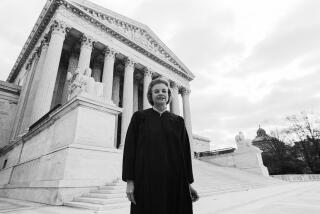Iraq female judge was a pioneer under Hussein, and still presides
- Share via
Reporting from Baghdad — When Suad Dabbagh and two other women graduated from Iraq’s Judicial Institute in 1979, they became the first female judges in a nation run by Saddam Hussein.
The novelty led to a deluge of news photo and interview requests. But progress was short-lived.
By the mid-1980s, when Hussein’s government once again stopped accepting women in its judicial study program, there were only six female judges.
These days, after eight wrenching years of invasion, occupation and rebuilding, the outlook is different: There are 72 female judges working in Iraqi courts.
Yet the job itself has barely changed, said Dabbagh, 61, who serves as a chief judge of Baghdad’s Juvenile Court. And the greater number, she says, has little to do with the influence of Western values on Iraqi culture.
“The increase of the number of female judges had nothing to do with the emphasis on equal rights that the Americans often demand, as there is no objection on that in the [Iraqi] law,” Dabbagh said.
“The Islamic movement can’t seek to forbid women from being judges,” she said, “because no text in the Koran or Islamic sharia forbids women from getting a judge’s position.”
Judges are far removed from politics, she said. “We don’t care who is ruling the country: secularists, Islamists or anyone else.”
Dabbagh grew up in a household in which women were encouraged to reach their potential. Her father, a pharmacist, had an extensive library, and she spent much of her time reading when she was young. She has since raised three daughters. One of them studied medicine; none has followed her into a legal career.
Dabbagh began working in the capital’s criminal courts in the mid-1970s after majoring in law at Baghdad University. She became an investigator in the Juvenile Court in 1976 and served as a judge in two smaller cities before returning to the Baghdad court for defendants who are between 9 and 19 years old.
She said it was not clear why Hussein’s government stopped accepting female judges after having briefly thrown the doors open. But “it was a political decision,” she said. “It wasn’t a decision against women.”
Nobody in her court — from prosecutors to defendants to witnesses — has ever raised a concern about women serving as judges, Dabbagh said. “We don’t feel that there is a man who has differentiated between men and women in the court.”
As in the American judicial system, Baghdad’s Juvenile Court handles cases ranging from theft to murder, granting special consideration to the age of defendants in meting out punishment.
“We consider the circumstances of the juvenile and the crime,” Dabbagh said. “He will be subjected to a study of social researchers and a doctor. They write a study about his mentality, his behavior.... As a judge, I read this research.”
Some Iraqi court observers believe that female judges can do a better job than their male counterparts in administering justice to juveniles.
Dabbagh says that “both women and men judges are accurate and firm” in rendering their decisions. But, she said, “the woman is always accurate.”
Raheem is a special correspondent.
More to Read
Sign up for Essential California
The most important California stories and recommendations in your inbox every morning.
You may occasionally receive promotional content from the Los Angeles Times.











